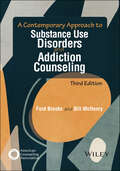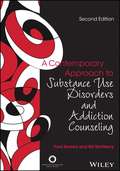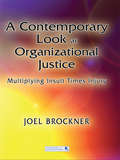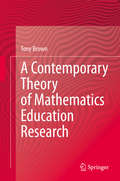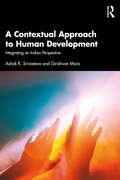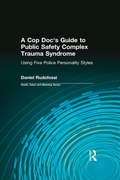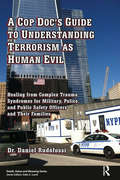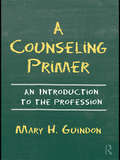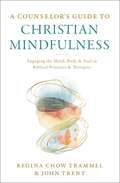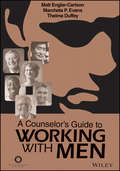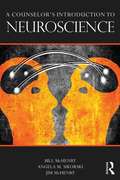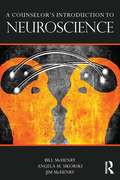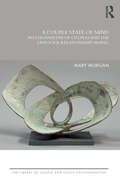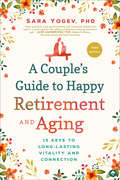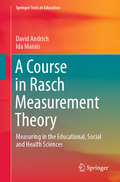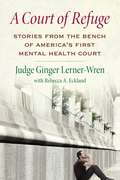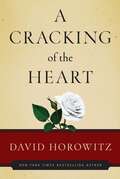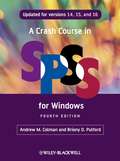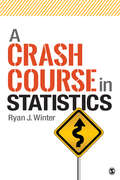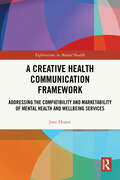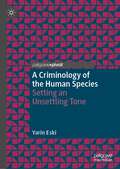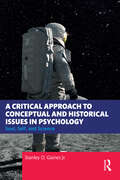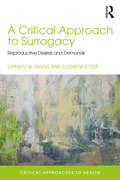- Table View
- List View
A Contemporary Approach to Substance Use Disorders and Addiction Counseling
by Ford Brooks Bill McHenryA unique offering of both knowledge and information, this third edition reflects the latest practices and time-tested data. Brooks and McHenry offer relevant case examples that showcase the therapy process as it relates to clients with a substance use disorder and the impact on their families. New approaches and techniques of medication-assisted treatment with opiate addiction, harm reduction, the use of peer recovery specialists and drug courts, and the importance of addressing trauma in the treatment process are thoroughly presented to ensure effective work with clients from intake through recovery. With a look at the impact of the COVID-19 pandemic included, mental health professionals will gain an empathic understanding of the nonlinear process of recovery. A supplemental Instructor’s Guide is available by request from ACA. *Requests for digital versions from ACA can be found on www.wiley.com *To purchase print copies, please visit the ACA website here *Reproduction requests for material from books published by ACA should be directed to permissions@counseling.org
A Contemporary Approach to Substance Use Disorders and Addiction Counseling, Second Edition
by Bill Mchenry Ford BrooksWritten as an introduction to the field of addiction counseling, this text covers the fundamental knowledge, understanding, and skills necessary to counsel people who are struggling with addiction. Drs. Brooks and McHenry provide a straightforward, compassionate, and holistic approach to treatment and recovery, from the major theoretical underpinnings, to assessment and diagnosis, to relapse prevention and spirituality. With a focus on current clinical applications and how-tos, this book is ideal both for master s-level addictions courses and for mental health clinicians.
A Contemporary Look at Organizational Justice: Multiplying Insult Times Injury (Organization and Management Series)
by Joel BrocknerThis book is for scholars with an interest in the burgeoning area of theory and research on organizational justice. The ideas it describes forge connections between the justice literature and other prominent bodies of knowledge in organizational and social psychology, including those pertaining to trust, social identity, attribution theory, regulatory focus theory and cross-cultural differences in people's beliefs and behaviors. Though intended primarily for researchers, this book is written in a very accessible way, so that informed practitioners will gain considerable value from it.
A Contemporary Theory of Mathematics Education Research
by Tony BrownThis book by-passes both psychology and sociology to present an original social theory centered on seeing mathematical learning by everyone as an intrinsic dimension of how mathematics develops as a field in support of human activity. Here, mathematics is defined by how we collectively talk about it. Drawing on psychoanalytic theory, the student is seen as participating in the renewal of mathematics through their contributions to our collective gaze on mathematics as the field responds to ever new demands. As such learning takes a critical stance on the standard initiations into current practices often promoted by formal education.In the field of mathematics education, researchers have moved from psychology where individual students were seen as following natural paths of development through existing mathematical knowledge, to socio-cultural models predicated on students being initiated into the human world and understood through the reflective gazes this world has of itself, such as those found in comparisons of student learning in different countries. This book addresses the domain, purpose and functioning of contemporary research in mathematics education and is an original contribution to this theme.The book is aimed at a mathematics education research audience. It continues a dialogue with existing publications, seen widely as a cutting edge and will also be of interest to students and practitioners in the fields of qualitative research, social theory and psychology.
A Contextual Approach to Human Development: Integrating an Indian Perspective
by Girishwar Misra Ashok K. SrivastavaThis textbook offers a unique insight into the theoretical and applied aspects of human development in relation to the cultural traditions of non-Western countries.Presented in a modular form, this comprehensive and thematic approach to lifespan development will help students develop an understanding of human development in varied Indian social contexts. Covering all stages of development including the development of self and personality, social understanding, human strengths, sustainable development, lifelong learning, and many more, the book highlights current research in these areas as well as provides learning objectives, points for reflection, web links, and a glossary.This book is an essential reading for undergraduate students of psychology, human development, and allied fields, as well as for postgraduates with an interest in studying human development in a non-Western context.
A Cop Doc's Guide to Public Safety Complex Trauma Syndrome: Using Five Police Personality Styles (Death, Value and Meaning Series)
by Daniel Rudofossi Dale A Lund"Cop Doc's Guide to Public Safety Complex Trauma Syndrome" is written in response to the need for an advanced, specialized guide for clinicians to operationally define, understand, and responsibly treat complex post-traumatic stress and grief syndromes in the context of the unique varieties of police personality styles. The book continues where Rudofossi's first book, "Working with Traumatized Police Officer Patients", left off. Theory is wed to practice and practice to effective interventions with police officer-patients. The 'how' and 'why' of a clinician's approach is made highly effective by understanding the distinct personality styles of officer-patients. Rudofossi's theoretical approach segues into difficult examples that highlight each officer-patient's eco-ethological field experience of loss in trauma, with a focus on enhancing resilience and motivation to - otherwise left disenfranchised. Thus, this original work expands the ecological-ethological existential analysis of complex PTSD into the context of personality styles, with an emphasis on resilience - without ignoring the pathological aspects of loss that often envelop officer-patient trauma syndromes.
A Cop Doc's Guide to Understanding Terrorism as Human Evil: Healing from Complex Trauma Syndromes for Military, Police, and Public Safety Officers and Their Families (Death, Value, and Meaning)
by Daniel RudofossiFirst Published in 2017. This book provides profound insights into the terrorist mind, the impact of terrorism on the hearts and minds of those who must confront and battle the evil of terrorism, case studies in courage in the battle against terrorism, and (finally, most of all) this book provides a strategy and underlying set of principles that we must use to defeat terrorism and “not only survive but . . . give strength back to others.”
A Counseling Primer: An Introduction to the Profession
by Mary H. GuindonA Counseling Primer presents an introduction to the counseling profession that provides students with a foundation for success. This engaging and accessible text covers the core CACREP Standard of Professional Orientation with a comprehensive overview of the field. It: Anticipates the questions of beginning students with a series of chapters that ask who counselors (and clients) are, what counseling is, when and where it is practiced, and why counselors choose the profession. Introduces students to the basics of essential attending and listening skills. Challenges readers with case vignettes and discussion questions. Encourages self-reflection and offers skills for observation of others. Supports student learning with extensive pedagogical features and resources. Enhances the reading experience with a robust online instructor's manual. This engaging textbook is full of useful features to enhance the learning experience. Each chapter includes "points to ponder", case examples, an "in practice: what would you do?" vignette with discussion questions, and a chapter summary. A self-reflection journaling exercise, termed the TFAC Chart (Thoughts, Feelings, Actions, Context) reinforces the material from each chapter and facilitates student growth. A Counseling Primer: An Introduction to the Profession is accompanied by a rich array of supplementary materials that are made available to qualifying adopters and their students completely free of charge. Our online resources are hosted on the Moodle course management system. Instructor Resources include: A sample course syllabus Chapter-by-chapter PowerPoint lecture slides Chapter-by-chapter Instructor Notes, including chapter summary, learning objectives, and instructions for suggested in-class activities and assignments An interactive test bank for each chapter (including multiple choice, true or false, and essay question formats). The tests and notes are available for download by instructors in a variety of useful formats, to suit your needs. Student Materials include: TFAC (Thoughts, Feelings, Actions, and Context) Journaling forms for self-reflection Class handouts for assigned and optional review activities
A Counseling Primer: An Orientation to the Profession
by Mary H. Guindon Jessica J. LaneA Counseling Primer, second edition, introduces students to the profession of counseling, reviews its training curriculum, discusses current professional standards, and presents basic counseling skills. The text is designed to answer students’ most commonly asked questions around the who, what, where, when, why, and how of counseling. Updated and aligned with the eight 2016 CACREP core areas, the second edition includes new chapters by experts from seven entry-level specialty areas, including school counseling, career counseling, and mental health counseling. The book also contains useful features to enhance the learning experience, including case examples, class handouts and activities, a sample syllabus, discussion questions, and more. A variety of online resources including instructor’s manual, PowerPoint slides, tests, class activities, and student supplements are also available for download. In a comprehensive and accessible format, A Counseling Primer, second edition, provides students with a succinct, up-to-date picture of the counseling profession and the tools they need to make their contribution to the field.
A Counselor's Guide to Christian Mindfulness: Engaging the Mind, Body, and Soul in Biblical Practices and Therapies
by John Trent Dr. Regina Chow TrammelEquips Christian counselors and therapists to confidently use mindfulness techniques with their clients in a way that is both practical and biblical. Accessing mindfulness is a therapeutic touchstone for a range of emotional issues, from mild distress to the treatment of trauma, but the term mindfulness has often left Christians wary. Stripped of Christlike spirituality, it sounds self-focused at best, and at worst like a fusion with modern pop-religions of the day.But the quality of mindfulness—of being fully present, aware of ourselves and our situation so that we can better respond to the chaos around us—is a profoundly biblical concept. And it can be used effectively by Christian counselors and healing practitioners.In A Counselor's Guide to Christian Mindfulness, Regina Chow Trammel (a clinical social worker) and John Trent (a marriage and family therapist) team up to offer training in mindfulness skills used in evidence-based practices, such as dialectical behavioral therapy, acceptance and commitment therapy and mindfulness-based cognitive therapy. These therapies have been shown to be highly effective in the treatment of many mental health issues, blending elements of neuroscience, social science, and religious training.This book is the ideal resource to equip those in the helping professions to faithfully use mindfulness interventions both professionally and personally and includes:A historical and theoretical overview of Christian mindfulness and how it contrasts with other mindfulness-based practices.A practical guide for how to use mindfulness skills in counseling and therapeutic practice.A section addressing specific challenges or situations that your clients face.Dialogue scripts and contemplation exercises to adapt for your own work.The practice of Christian mindfulness can be effective in helping clients manage their intrusive and stressful thoughts, emotions, relationships, and challenges. This book fills a gap for Christian counselors and therapists who are eager for a resource that teaches mindfulness skills from a Christian and biblical perspective.
A Counselor's Guide to Working with Men
by Matt Englar-Carlson Marcheta P. Evans Thelma DuffyThis book examines a variety of critical issues pertaining to the psychology of men and masculinity and presents successful, evidence-based strategies for treatment. Part 1 focuses on treating men in couples counseling, group work, and career counseling, as well as counseling men about their health. Part 2 explores the intersections of identity for sexual minority men, older men, and fathers, and discusses spiritual work with men in life transitions. Part 3 addresses the concerns of men in the military, prevention of sexual violence, and treating men with addictions and trauma-related issues. Part 4 provides the specific clinical frames of female counselors using relational–cultural theory with men, and examines using motivational and masculine-sensitive therapy with men. Examples and vignettes throughout the text provide clinical relevance, and reflective questions in each chapter encourage readers to explore their own biases and ideas about working with men. *Requests for digital versions from the ACA can be found on wiley.com. *To request print copies, please visit the ACA website here. *Reproduction requests for material from books published by ACA should be directed to permissions@counseling.org.
A Counselor's Introduction to Neuroscience
by Bill Mchenry Angela M. Sikorski Jim MchenryThe book is about the complexities of human brain and counselling. The authors have clearly explained the overlap of these two fields, that is easily comprehensible by a lay man.
A Counselor’s Introduction to Neuroscience
by Angela M. Sikorski Bill McHenry Jim McHenryA Counselor’s Introduction to Neuroscience is a guidebook to neurobiology that is customized for counselors’ unique goals and requirements. Drawing on years of experience, not only in the lab, but in the counselor’s chair, the authors unravel the complexities of neuroscience and present an easily understood volume that is an essential companion for any counselor who wishes to expand his or her understanding of the human brain, how it works, and how it creates our identities.
A Couple State of Mind: Psychoanalysis of Couples and the Tavistock Relationships Model (The Library of Couple and Family Psychoanalysis)
by Mary MorganA Couple State of Mind is a much anticipated book aimed at an international audience of practitioners, students and teachers of psychoanalytic couple therapy, describes the Tavistock Relationships model of couple psychoanalytic psychotherapy, drawing on both historical and contemporary ideas, including the author’s own theoretical contributions. The book references contemporary influences of other psychoanalytic approaches to couples, particularly from an international perspective. It will be invaluable for all students learning about psychoanalytic work with couples for other psychoanalytic practitioners interested in this field.
A Couple's Guide to Happy Retirement and Aging: 15 Keys to Long-Lasting Vitality and Connection
by Sara YogevA Couple’s Guide to Happy Retirement and Aging is the most comprehensive book devoted entirely to individual and couples relationship issues in the later stage of life. Not a treatise on money management, this is a much-needed guide to the psychological aspects of aging and how to make your relationship happy, fruitful, loving, and successful during your retirement years.Written by Dr. Sara Yogev, a psychologist specializing in work and family issues, A Couple's Guide to Happy Retirement and Aging summarizes the latest research findings and draws from actual accounts of couples. This book will help you and your partner:prepare emotionally for the dramatic life changes during retirement yearsfind new purposes to your life beyond worknurture your relationship and strengthen your friendship and love as you ageexplore sexuality at this stage of life including how you can enjoy each other as much as you did as a younger coupleimplement strategies to successfully deal with differences around money, time together versus apart, housework, and family relationshipsThe 2018 edition includes new chapters about substance abuse, cohabitation, and the impact of technology on senior couples as well as updates to all previous chapters. It is crucial that couples prepare themselves and their marriages psychologically for their retirement years, which could very well be a quarter of their lives. A Couple’s Guide to Happy Retirement and Aging shows you how to do that—so that you’ll have the time of your lives.
A Course in Rasch Measurement Theory: Measuring in the Educational, Social and Health Sciences (Springer Texts in Education)
by David Andrich Ida MaraisThis book applies Rasch measurement theory to the fields of education, psychology, sociology, marketing and health outcomes in order to measure various social constructs. The chief focus is on first principles of both the theory and its applications. Because software is readily available to carry out analyses of real data, numerous small examples are provided in the book. The software used in these examples, and which is helpful in working through the text, is RUMM2030 (Rasch unidimensional models for measurement).The book’s main goals are to equip researchers with the confidence they need in order to be in control of the analysis and interpretation of data, and to make professional rather than primarily statistical decisions mechanically. Because statistical principles are necessarily involved, reviews of the requisite statistics are provided in the Appendix.The content is based on courses that have been taught both online and in intensive form for over two decades. Although first principles are emphasised, much of the book is based on research conducted by the two authors and their colleagues.
A Court of Refuge: Stories from the Bench of America's First Mental Health Court
by Ginger Lerner-Wren Rebecca A. EcklandThe story of America's first Mental Health Court as told by its presiding judge, Judge Ginger Lerner-Wren--from its inception in 1997 to its implementation in over 400 courts across the nationAs a young legal advocate, Ginger Lerner-Wren bore witness to the consequences of an underdeveloped mental health care infrastructure. Unable to do more than offer guidance, she watched families being torn apart as client after client was ensnared in the criminal system for crimes committed as a result of addiction, homelessness, and mental illness. She soon learned this was a far-reaching crisis--estimates show that in forty-four states, jails and prisons house ten times more people with serious mental illnesses than state psychiatric hospitals. In A Court of Refuge, Judge Ginger Lerner-Wren tells the story of how the first dedicated mental health court in the United States grew from an offshoot of her criminal division, held during lunch hour without the aid of any federal funding, to a revolutionary institution. Of the two hundred thousand people behind bars at the court's inception in 1997, more than one in ten were known to have schizophrenia, bipolar disorder, or major depression. To date, the court has successfully diverted more than twenty thousand people suffering from various psychiatric conditions from jail and into treatment facilities and other community resources. Working under the theoretical framework of therapeutic jurisprudence, Judge Lerner-Wren and her growing network of fierce, determined advocates, families, and supporters sparked a national movement to conceptualize courts as a place of healing. Today, there are hundreds of such courts in the US.Poignant and compassionately written, A Court of Refuge demonstrates both the potential relief mental health courts can provide to underserved communities and their limitations in a system in dire need of vast overhauls of the policies that got us here. Lerner-Wren presents a refreshing possibility for a future in which criminal justice and mental health care can work in tandem to address this vexing human rights issue--and to change our attitudes about mental illness as a whole.
A Cracking of the Heart
by David HorowitzAfter losing a loved one, "pay attention to the ways in which your relationship continues."So advised Sarah Horowitz in an interview she gave the day before her unexpected death. In A Cracking of the Heart, David Horowitz explores the legacy of his extraordinary daughter's short life, and narrates his quest for a deeper understanding of the child he lost.A remarkable woman and gifted writer, Sarah was afflicted with a birth condition that, while complicating and ultimately shortening her life, never affected her dreams. From an early age, she displayed inspiring courage in facing her own difficulties and boundless compassion for the underserved and overlooked in many communities, from an autistic niece in her own family to uneducated children in Africa.A Cracking of the Heart chronicles the separation of father and daughter through political and familial conflicts, and their slow reunion. Alternately searing and uplifting, it reconciles what could have been with what is, taking the reader through a father's love, frustration, admiration, and grief, to what lies beyond.
A Crash Course in SPSS for Windows
by Briony D. Pulford Andrew M. ColmanThis quick, simple, and user-friendly introduction to SPSS for Windows has now been updated so that it can be used with Versions 14 to 16 of the software. For this edition, a section has been added on partial correlation, together with new material on sorting, classifying, and coding data, inserting variables and cases, and paneling charts and graphs, and the chapter on charts and graphs has been completely rewritten in line with changes to the SPSS Chart Builder. The supporting website allows data sets used in the book to be downloaded from the Internet and provides additional examples from various social science disciplines.The fourth edition retains all of the features that have made the text so attractive to students and teachers:The material is concise and focused, enabling most users to learn the basics comfortably within 10 hours.All the most widely used statistical techniques and graphic facilities in SPSS for Windows are clearly described.Every statistical procedure is explained with the help of a step-by-step analysis of a numerical example taken from real data in published research.The authors have chosen small data sets so that readers do not waste unnecessary time inputting data.Screenshots on the page make it easy for students to cross between the text and the screen.Online support material to accompany the text is available at www.blackwellpublishing.com/crashcourse/
A Crash Course in Statistics
by Ryan J. WinterA Crash Course in Statistics is a short introduction to key statistical methods including descriptive statistics, one-way and two-way ANOVA, the t-test, and Chi Square. Each of the five chapters provides an overview of each method, and then walks readers through a relevant example, using SPSS to highlight how to run the statistics and how to write up the results in APA style. Each chapter ends with a self-quiz so that readers can assess their understanding of each statistical concept. This "crash course" supplement is a must-have statistics refresher for students taking research methods classes; a handy additional reference for introductory statistics students; and a guide for anyone who needs to be a consumer of statistics.
A Crash Course in Statistics
by Ryan J. WinterA Crash Course in Statistics is a short introduction to key statistical methods including descriptive statistics, one-way and two-way ANOVA, the t-test, and Chi Square. Each of the five chapters provides an overview of each method, and then walks readers through a relevant example, using SPSS to highlight how to run the statistics and how to write up the results in APA style. Each chapter ends with a self-quiz so that readers can assess their understanding of each statistical concept. This "crash course" supplement is a must-have statistics refresher for students taking research methods classes; a handy additional reference for introductory statistics students; and a guide for anyone who needs to be a consumer of statistics.
A Creative Health Communication Framework: Addressing the Compatibility and Marketability of Mental Health and Wellbeing Services (Explorations in Mental Health)
by Jane HearstThis groundbreaking volume offers a theoretical, practical, and evidence-based approach to bridging the gap between service-users, -providers, and -commissioners in order to establish Creative Health as a valued part of healthcare, and a key player in the broader healthcare marketplace.Offering actionable strategies to strengthen interdisciplinary networks and enrich the Creative Health landscape within modern healthcare systems, the book provides a comprehensive analysis of how economic systems, healthcare philosophy, and societal perceptions shape the uptake and effectiveness of Creative Health services. It outlines the systemic barriers to widespread recognition and identifies how targeted communication can engage both service-users and market forces. Through pragmatic solutions and narrative-based research, chapters present the concept of 'market wellbeing' — a negotiation space that aligns the needs of individuals with healthcare market objectives, fostering stronger connections and sustainability for Creative Health. Ultimately, an entirely novel Creative Health Communication Framework is outlined in the third part of the volume, designed to empower readers with the insights and strategies that can reshape how Creative Health is communicated and valued.This will be a key volume for scholars, researchers, and postgraduate students in Creative Health, creative arts and expressive therapies, and mental health and health psychology more broadly. Creative Health practitioners should also find this volume of use.
A Criminology of the Human Species: Setting an Unsettling Tone (Palgrave Studies in Green Criminology)
by Yarin EskiThe book sketches out how the criminological lens could be used in the climate change debate around possible human extinction. It explores the extent to which the human species can be considered deviant in relation to other species of the contemporary biosphere, as humans seem to be the only species on Earth that does not live in natural balance with their environment (anymore). It discusses several unsettling topics in the public debate on climate change, specifically the taboo of how humans may not survive the ongoing climate change. It includes chapters on the Earth’s history of mass-extinctions, the global state of denial including toward the possibility that the human species could go extinct, and it considers humans' future as a deviant, fatal species outside of Earth, in outer-space, possibly on other planets. It puts forward and enriches the critical criminological tradition by conceptualizing and setting an unsettling tone within criminology and criminological research on the human species and our extinction, by daring criminologists (and victimologists) to ponder and seek empirical answers to controversial imaginations and questions about our possible extinction.
A Critical Approach to Conceptual and Historical Issues in Psychology: Soul, Self, and Science
by Stanley O. Gaines, Jr.A Critical Approach to Conceptual and Historical Issues in Psychology: Soul, Self, and Science examines the evolving concept of human consciousness throughout the ages to show how humanity progressed from ‘studies of the soul’ – a major concern of ancient philosophy – to a science of the mind including the self – a primary concern of contemporary psychology.Divided into five parts, the book moves through the history of psychology from its philosophical roots into the present day and beyond. It takes a balanced and critical approach to figures and theories which have been instrumental in the development of psychology as a discipline, such as Plato, Descartes, Wundt, Du Bois, Freud, Jung, Watson, Skinner, and Maslow. Throughout, it offers diverse perspectives on the field’s history, providing insights into such topics as race and intelligence, gender and personality, and their treatment within psychology. Each chapter is supported by breakout boxes highlighting key theories related to that chapter’s topic. Thought questions, to encourage the reader to critically evaluate what they have read, notes with further information, and suggestions for further reading are provided online.Of particular interest to postgraduate students on MSc conversion courses, the book will also interest undergraduate students completing history of psychology, conceptual and historical issues in psychology, history and systems of psychology, and related modules. This textbook was designed to comply with the QAA Subject Benchmark Statement in Psychology and the BPS accreditation guidelines for content in Conceptual and Historical Issues in Psychology
A Critical Approach to Surrogacy: Reproductive Desires and Demands (Critical Approaches to Health)
by Damien W Riggs Clemence DueThis comprehensive text makes an important contribution to the study of surrogacy, developing a novel theoretical framework through which to understand the broader social contexts as well as individual decisions at play within surrogacy arrangements. Drawing on empirical research conducted by the authors and supplemented by secondary analyses of media, legislative and public accounts of surrogacy, the book engages with the key stakeholders involved in the practice of surrogacy. Specifically, it canvases the standpoints of women who act as surrogates, intending parents who commission surrogacy arrangements, children born through surrogacy, clinics that facilitate the arrangements, and politicians and journalists who engage with the topic. Through a focus on capitalism as a means of orientating ourselves to the topic of surrogacy, the book highlights the vulnerabilities that potentially arise in the context of surrogacy, as well as the claims to agency invoked by some parties in order to mitigate vulnerability. In so doing, the book demonstrates that the psychology of surrogacy must be broadly understood as an orientation to particular ways of thinking about children, reproduction and economies of labour.
